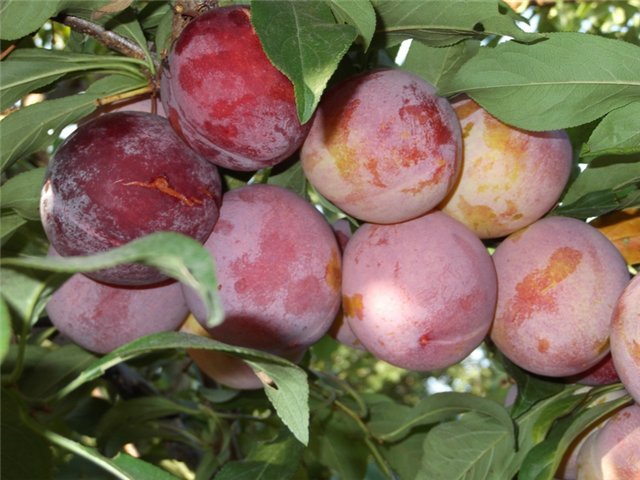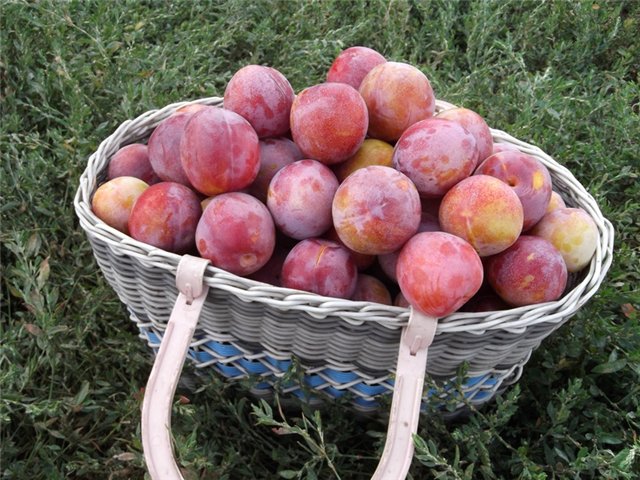Plum Alyonushka: variety description and tree care
Content
Characteristic
This plum variety was obtained at the All-Russian Research Institute of Selection of Fruit Crops and was the result of crossing such varieties as Kitayanka and Krasny Shar. The authors of the Alenushka variety are G.B. Zhdanov and A.F. Kolesnikov.
If we talk about the description of the tree, then it is a medium-sized culture, the height of which can be up to 2.5 meters. It has straight shoots with a reddish-brown color, as well as a pyramidal crown.
Also, the Alenka variety is characterized by the presence of medium-sized convex lentils, as well as conical buds. As for the leaves, they are obovate and elongated. They have a light green color and some jagged edges. Up to three pieces of iron are clearly visible on the surface of each leaf. The stalk is pigmented, about 20 mm long. The flowers have white petals; about three of them can appear in the inflorescence. The stigma of the pistil is located slightly above the anthers.
The fruits of such a plum are rounded and can weigh up to 35 grams. They have a dark red color characteristic of this variety. If we talk about the pulp of the Alyonushka variety, then it is dense in consistency, has an orange color. Fruits are of medium thickness with a short stalk. The stone is normally separated from the middle, the pulp of this plum variety pleases with a sweet and sour taste, for which it has earned high marks from experts - 4, 8 points.
Alenka is a table variety, the composition of which is as follows - fruits contain about 11.6% of dry matter, about 8.77% of sugars, and 1.39% of acids.
If we talk about the main characteristics of this kind of plum, it should be noted that its fruiting falls on fairly early terms - somewhere on May 15 - 20. During the fruiting period, this plum is capable of entering the third year. Since the variety itself is sterile, it needs pollinators such as the early-fruiting plum, as well as other varieties of Russian and Chinese plums. Shows increased resistance to cracking, as well as the following ailments that can affect fruit trees - moniliosis and clasterosporium. Has an average degree of frost resistance. If we talk about the yield of such a tree, then on average you can collect about 88.6 centners of fruits per hectare, and the maximum yield indicator can in rare cases be up to 199.8 centners. This variety can be used both for industrial purposes and as an amateur or breeding crop.
The clear advantages of this fruit tree include high taste characteristics of fruits, as well as their presentable appearance. Their disadvantages can be called the fact that often young shoots and leaves are able to attack aphids, as a result of which the yield is significantly reduced.
Video Help for gardeners: varieties of plums ”
Planting and leaving
The root system of the plum tree is rather shallow, so it is very demanding on the presence of moisture in the soil. The plum also loves to be in the sun. All this should be considered when planting a fruit tree in your garden.It is also necessary to choose a place for planting plums that is calm - for these purposes, for example, a piece of land near the fence is well suited.
Too low soils, in which there is a close occurrence of groundwater, are not suitable for planting this type of fruit tree. The flowering period for such a tree begins early, therefore, so that it does not suffer from frost, a protected area with fertile soil should be preferred.
It is recommended to plant plums in early spring until the first buds bloom. The landing pattern adopted in this case is 3 by 4 meters. It is necessary to prepare a pit for planting about 40 cm wide and up to 60 cm deep. For planting, it is customary to use a mixture of fertile soil with two buckets of manure, peat and organic fertilizers, mineral fertilizers are also added - a glass of superphosphate and three tablespoons of urea, as well as three tablespoons of potassium sulfate. All this is laid in a prepared hole and poured with water. In the event that the pit is not filled to the brim, add a small amount of soil and water again. Sprinkling the straightened roots with earth, they should also be watered at the same time, then the soil should be leveled and carefully tamped.
As for the subsequent care of the fruit tree, it includes a whole range of measures necessary for full growth and development - such as mulching and loosening the earth, removing unnecessary weeds, regular watering, making all the necessary fertilizing, pruning branches, as well as monitoring the subject of the appearance of pests or diseases. In the event that there is a likelihood of obtaining a large harvest of fruit, you can thin out the ovaries in order to ultimately enjoy large fruits and prevent the possible breakage of the branches due to their overload. To do this, carefully cut off the ovaries with a special pruner and place the supports.
Video "Popular varieties"
From the video you will learn what types of plums are common in the region of our region.




